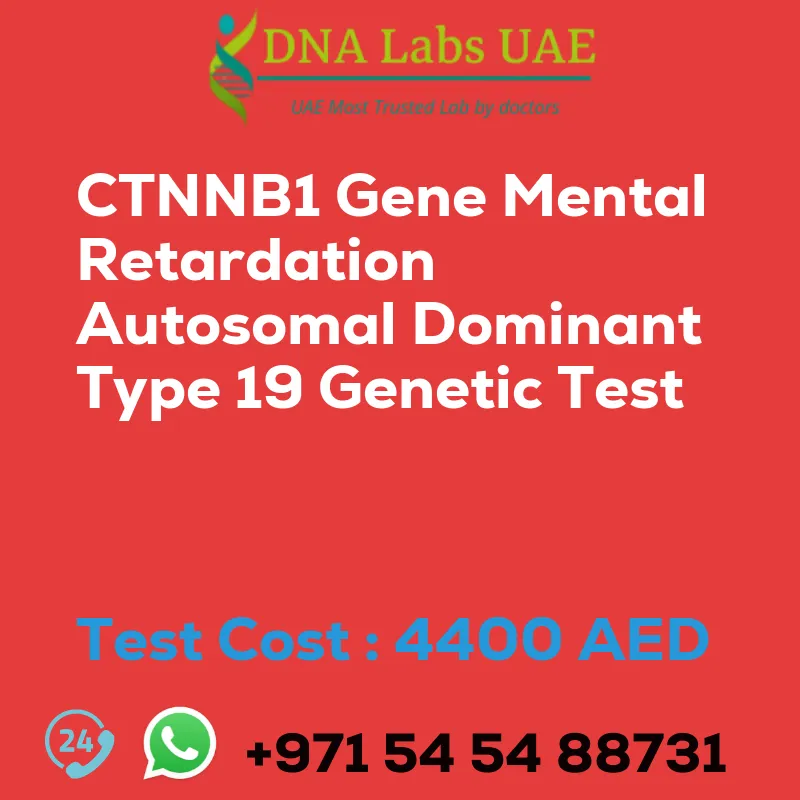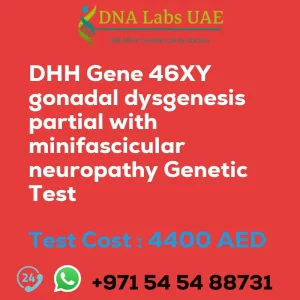CTNNB1 Gene Mental Retardation Autosomal Dominant Type 19 Genetic Test
At DNA Labs UAE, we offer the CTNNB1 Gene Mental Retardation Autosomal Dominant Type 19 Genetic Test. This test is designed to analyze the CTNNB1 gene for mutations or genetic variants that may be associated with mental retardation, autosomal dominant type 19 (MRD19).
Test Components
The CTNNB1 Gene Mental Retardation Autosomal Dominant Type 19 Genetic Test includes:
- NGS Technology
Price
The cost of the CTNNB1 Gene Mental Retardation Autosomal Dominant Type 19 Genetic Test is 4400.0 AED.
Sample Condition
We accept the following sample conditions for this test:
- Blood
- Extracted DNA
- One drop of blood on FTA Card
Report Delivery
The report for the CTNNB1 Gene Mental Retardation Autosomal Dominant Type 19 Genetic Test will be delivered within 3 to 4 weeks.
Method
We use NGS (Next-Generation Sequencing) technology to perform the CTNNB1 Gene Mental Retardation Autosomal Dominant Type 19 Genetic Test.
Test Type
The CTNNB1 Gene Mental Retardation Autosomal Dominant Type 19 Genetic Test is specifically designed for neurological disorders.
Doctor
This test is conducted under the supervision of a Neurologist.
Test Department
The CTNNB1 Gene Mental Retardation Autosomal Dominant Type 19 Genetic Test is conducted in our Genetics department.
Pre Test Information
Prior to the CTNNB1 Gene Mental Retardation Autosomal Dominant Type 19 Genetic Test, it is important to provide the clinical history of the patient. Additionally, a genetic counseling session will be conducted to draw a pedigree chart of family members affected with CTNNB1 Gene Mental Retardation Autosomal Dominant Type 19.
Test Details
The CTNNB1 gene is responsible for producing a protein called beta-catenin, which plays a crucial role in cell adhesion, communication, and the regulation of various cellular processes. Mutations in the CTNNB1 gene have been associated with MRD19, a rare genetic disorder characterized by intellectual disability, delayed development, and other neurological abnormalities.
NGS genetic testing is a powerful tool used to analyze an individual’s DNA sequence. It allows for the simultaneous analysis of multiple genes, including the CTNNB1 gene, to identify any mutations or genetic variants that may be present. By performing the CTNNB1 Gene Mental Retardation Autosomal Dominant Type 19 Genetic Test using NGS technology, healthcare professionals can determine if there are any mutations in the CTNNB1 gene that may be causing MRD19. This information is valuable for diagnosing the condition, providing appropriate medical management, and offering genetic counseling to affected individuals and their families.
| Test Name | CTNNB1 Gene Mental retardation autosomal dominant type 19 Genetic Test |
|---|---|
| Components | |
| Price | 4400.0 AED |
| Sample Condition | Blood or Extracted DNA or One drop Blood on FTA Card o |
| Report Delivery | 3 to 4 Weeks |
| Method | NGS Technology |
| Test type | Neurological Disorders |
| Doctor | Neurologist |
| Test Department: | Genetics |
| Pre Test Information | Clinical History of Patient who is going for CTNNB1 Gene Mental retardation, autosomal dominant type 19 NGS Genetic DNA Test A Genetic Counselling session to draw a pedigree chart of family members affected with CTNNB1 Gene Mental retardation, autosomal dominant type 19 |
| Test Details |
The CTNNB1 gene is responsible for providing instructions for the production of a protein called beta-catenin. This protein plays a crucial role in cell adhesion and communication, as well as in the regulation of various cellular processes. Mutations in the CTNNB1 gene have been associated with a rare genetic disorder known as mental retardation, autosomal dominant type 19 (MRD19). MRD19 is characterized by intellectual disability, delayed development, and other neurological abnormalities. NGS (Next-Generation Sequencing) genetic testing is a powerful tool used to analyze the DNA sequence of an individual’s genes. It allows for the simultaneous analysis of multiple genes, including the CTNNB1 gene, to identify any mutations or genetic variants that may be present. By performing an NGS genetic test on an individual suspected of having MRD19, healthcare professionals can determine if there are any mutations in the CTNNB1 gene that may be causing the disorder. This information can be valuable for diagnosing the condition, providing appropriate medical management, and offering genetic counseling to affected individuals and their families. |







